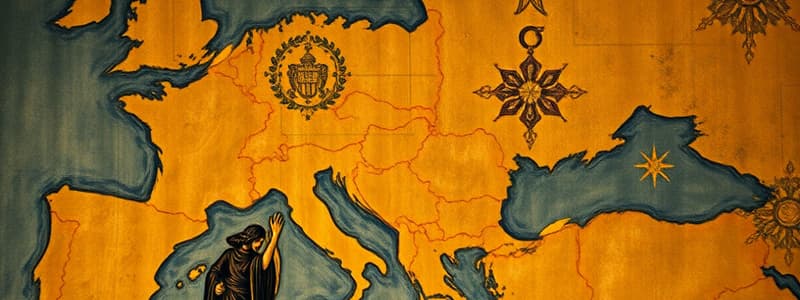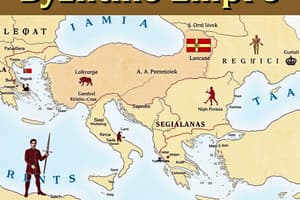Podcast
Questions and Answers
What were some key factors that contributed to the downfall of the Byzantine Empire?
What were some key factors that contributed to the downfall of the Byzantine Empire?
A weak military, divisions in Christianity, and the growth of Muslim lands were key factors.
Who was the founder of Islam and what role did he play in its emergence?
Who was the founder of Islam and what role did he play in its emergence?
Prophet Muhammad was the founder of Islam and he played a crucial role in its emergence.
How did religious divisions influence the stability of the Byzantine Empire?
How did religious divisions influence the stability of the Byzantine Empire?
Religious divisions within Christianity created internal conflicts that undermined the empire's stability.
In what ways did the growth of Muslim lands impact the Byzantine Empire?
In what ways did the growth of Muslim lands impact the Byzantine Empire?
What is the significance of Prophet Muhammad in the context of religious movements in the 7th century?
What is the significance of Prophet Muhammad in the context of religious movements in the 7th century?
Flashcards
Byzantine Empire Downfall
Byzantine Empire Downfall
The Byzantine Empire declined due to a weak military, internal religious divisions, and the expansion of Muslim territories.
Prophet Muhammad
Prophet Muhammad
Prophet Muhammad is considered the founder of Islam, a monotheistic religion.
Internal Divisions in Christianity
Internal Divisions in Christianity
The Byzantine Empire experienced religious divisions within Christianity, leading to conflicts and instability.
Muslim Lands Expansion
Muslim Lands Expansion
Signup and view all the flashcards
Weak Byzantine Military
Weak Byzantine Military
Signup and view all the flashcards
Study Notes
Factors Contributing to the Byzantine Empire's Decline
- A weakened military frequently engaged in conflicts with external threats like the Arabs, Persians, and Slavs contributed significantly to the Empire's decline. Constant pressure and costly wars depleted resources and manpower.
- Internal conflicts and political instability, often spurred by religious dissent and rivalries among factions, weakened the empire's ability to defend itself and efficiently administer its territories.
Religious Divisions Within Christianity
- Divisions within Christianity, particularly the growing rift between the Eastern Orthodox Church and the Roman Catholic Church, weakened the empire's unity and hampered its ability to present a strong, united front against external pressures. Differences in doctrine and practices created friction between various groups, leading to internal strife.
- These religious divisions also created opportunities for external forces to exploit vulnerabilities.
Expansion of Islamic Lands
- The expansion of Islamic territories and the subsequent conflicts with the Byzantine Empire put immense strain on its resources and manpower. Conquests brought about by rapidly expanding Islamic armies deprived the Byzantine Empire of valuable territories and resources, further weakening its military and economic power.
- The control of important trade routes by Islamic forces impacted the Byzantine Empire's economy significantly, reducing its access to vital commodities and markets. This impacted its ability to maintain its military strength and administrative capabilities.
The Beginning of Islam
- Prophet Muhammad, considered the founder of Islam, established a new monotheistic faith that spread rapidly throughout Arabia and beyond, challenging existing power structures and political alliances.
- His teachings and the subsequent growth of Islamic forces led to considerable military and territorial expansion in the region. This expansion proved a major adversary to the continuing existence of the Byzantine empire, affecting trade, territories, and military strength.
Studying That Suits You
Use AI to generate personalized quizzes and flashcards to suit your learning preferences.




